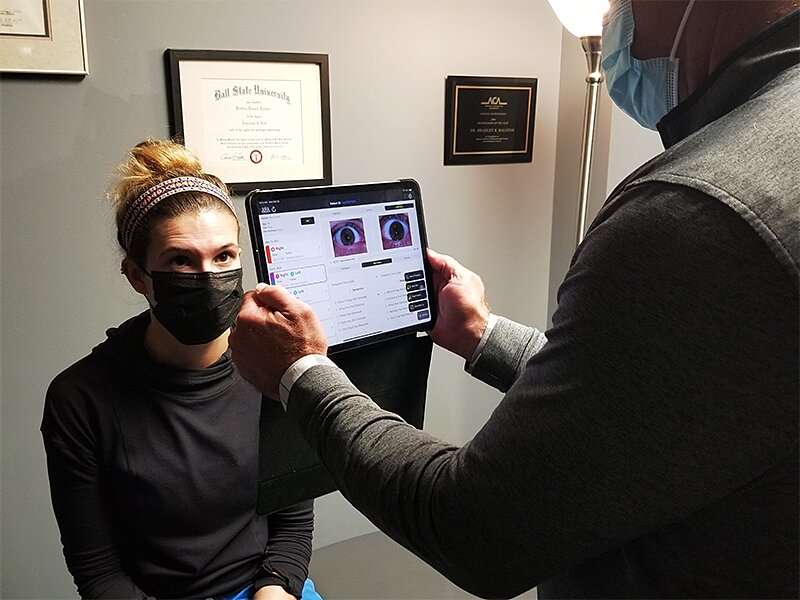The Reflex product suite from brightlamp, a Purdue University-affiliated company, allows a broad spectrum of medical professionals to securely capture critical diagnostic pupillary light reflex data. Reflex was used to perform a retrospective clinical review of patients cared for in neurological clinics. Results were published in the peer-reviewed journal Life. Credit: Image provided
Evaluating concussion patients for recovery and measuring compounding injuries can be done as simply as recording a video with a smartphone.
Reflex, a smartphone application developed by Purdue Foundry-affiliated startup brightlamp, works like a pupillometer. It takes a digital video recording of an individual's eye to measure a response called pupillary light reflex. The user holds the camera up to an eye and taps the smartphone screen. A light flashes to initiate a response from the pupil. Reflex is a Class I 510(k) exempt regulated medical device, according to the U.S. Food and Drug Administration.
Doctors across North America used Reflex to perform a retrospective clinical review of patients cared for in neurological clinics. The results of the study were published in Life, an international, peer-reviewed, open access journal of life sciences scientific studies.
Dr. Frederick Carrick, professor of neurology at the University of Central Florida College of Medicine, said Reflex identifies biomarkers that might be used in clinical diagnosis, treatment and decision-making for concussions.
"Physicians have measured pupillary light reflex since the earliest time of recorded history," Carrick said. "It is only recently that advances in technology have allowed us to quantify it accurately. This is the largest study of concussion and PLR to date."
Kurtis Sluss, CEO and founder of brightlamp, said the published study in Life proves Reflex is entirely suitable as a concussion clinical decision support tool.
"We are rapidly integrating this knowledge into a new concussion-based clinical decision support metric that current and future users can use to monitor their patients more rigorously," Sluss said.
"Clinicians and trainers now have the evidence they need to confidently integrate Reflex into their concussion workflow. Our goal as a company is to optimize the recovery trajectory for concussion patients and prevent compounding injury so they can lead healthier lives."
Sluss has received commercialization guidance from the Purdue Foundry, an entrepreneurship and commercialization hub housed in the Convergence Center for Innovation and Collaboration in Discovery Park District at Purdue, adjacent to the Purdue campus.
More information: Frederick Robert Carrick et al, The Pupillary Light Reflex as a Biomarker of Concussion, Life (2021). DOI: 10.3390/life11101104
Provided by Purdue University
























